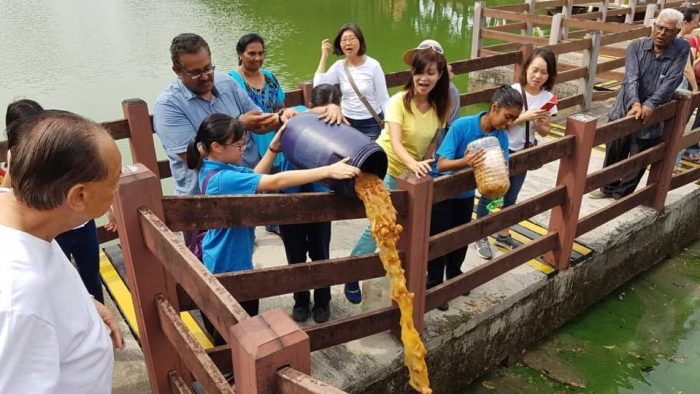Priti Rao, bio enzyme expert, met Erin and Susie of Ohio, when they were in India on a spiritual tour. The Atma Darshan Ashram at Bangalore where the couple were learning yoga, had invited Priti to conduct a program on bio enzymes as some of the participants were water activists.
A practitioner of the Bihar school of Yoga herself, she calls her journey in saving the environment - ‘Bio- enzyme saadhna’. “Each one of us is made up of the same soul, whether plants, microbes, soil, water or humans. Forms may be different. This became clear to me with my yogic sadhna. Yoga is the sutradhar that has been connecting me with like-minded people globally. It has shown me how to live in harmony with everything. At the Youngstown museum in Ohio, I was extremely surprised to see a painting of the seven chakras. At the bottom was written - Presented by Bihar School of Yoga!”

Priti, founder of Soil and Soul Foundation has tacked contaminated water bodies, land filled with garbage, and the looming water crisis with bio enzymes. Bioenzymes are organic degradable materials, currently introduced as soil improvement additives. Her solution takes care of organic waste and stops the chemical inflow in our drains and thereby into water bodies.
Says Priti, “'Go Green' is effective only when it is accompanied by bio enzymes. ‘Plantation, reuse, refuse, recycle’ is meaningless if we don’t embrace chemical free living. Bio enzymes are the alternative to the countless chemicals that we use in our daily life.”
The bio enzyme fever is spreading across India. She is showing the country how to convert waste into a value-added product. Karnataka, Maharashtra, UP, New Delhi, Sikkim, Meghalaya. She has caught the attention of visitors from overseas when they participated in her programmes at Bangalore.

Sonja of Germany had attended their outbound experiential learning tour in a weaver’s community. Sonja later asked her Head of Department to invite Priti to Frankfurt University of Applied Sciences.
Speaking about her experience in Germany, Priti says that, “It was the first session outside our country, and it was well received. Engineering students of Frankfurt University wished to explore the area of sustainable development. Engineering students were asked to pick orange peels from the canteen for the process. They could not believe that it was possible to live without chemicals.”
The beginnings were accidental. “Bio enzyme was an accidental discovery. It started with one bin. I wanted to take control of the situation in Bangalore and began segregating wet waste from dry. The dry waste went to BBMP, and the wet waste was turned into compost. In a few months, I had a lot of compost, and as a natural second step, I grew plants on my terrace to utilise it. I installed a biogas plant on my terrace. But I realised that citrus peels where not liked by the biogas plant.”
She asked for Dr Joean Oon’s guidance and slowly through trial and error she started converting her citrus peels into bio-enzymes. “These are activated microbes and the best and easy ones to make are plant based ones. We used plant accelerators which take care of food rejects, fruit and vegetable refuse. These are fermented for 90 days. and after 90 days bio-enzymes are ready to rid the household of chemicals!” It was a natural progression, from segregation to composting to making bio-enzyme cleaners.
Through the Soil and Soul Foundation, they seek to provide experiential learning on living sustainably. “We conduct workshops on sustainable lifestyle, water rejuvenation, farm trails, tribal exchange and afforestation. The concept of Community Action Plan is introduced during our workshop; based on their inspiration participants are equipped to create their own blueprint to nurture the self and the environment. We hope to bring in small, little changes to our society through our humble efforts.”
Today bio enzymes are being used to clean up lakes and rivers in a big way. Recently the eco enzyme initiative team spearheaded by Priti, poured hundreds of litres of enzyme into Yellahanka lake in Bangalore. These were produced during the lessons conducted in workshops by Enzymesos Team.
In October, 2019 she was hosted by Erin and Susie at Youngstown, Ohio. She says that while in India barely 5% will practice what they have learnt in the programme but abroad almost 80 to 90 % will make it part of their daily life. She was overwhelmed by response of the residents of Youngstown and their zeal for living a chemical free life. The programme was hosted by Erin Timms who owns the Calvin Art Centre and the whole building is now on Bio-enzymes.

About her US experience she says the house where she stayed was stocked with bio enzymes after their Bangalore experience. Kitchen cupboards, bathrooms and the freezer was packed with peels of fruits and vegetables! “It felt like being in my own home,” says Preeti.





